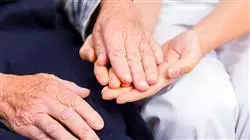University certificate
Accreditation/Membership

The world's largest faculty of nursing”
Introduction to the Program
The elderly require different health care services, which makes it necessary for nursing professionals to have knowledge of psychogeriatrics in order to be more effective in their care"

Most of the specializations that exist today try to palliate the effects of diseases or simply accompany the elderly person in an attempt to improve their suffering. In this Master's Degree, we have designed a whole intervention, guided by the knowledge of brain functioning from the age of 65 onwards, which aims not so much to provide palliative treatment, but to try to help the elderly person overcome their suffering and become satisfied with their life. Program for nursing professionals aims to broaden the specialization of healthcare professionals, so that they can complement it and offer a more complete and personalized care.
By studying this Master's Degree the professional will learn to analyze the current state of old age in society, as well as prepare themselves for the immediate future, since, in the coming decades, when the young people of today are elderly people, new knowledge and tools will be needed to achieve the best possible quality of life. Therefore, knowing the history of the person is fundamental whatever the age at which we work, but in old age it is essential not only as a means of knowledge to be able to intervene, but also as an end of the intervention itself.
Addressing loneliness, boredom, physical pain and cognitive deficits is essential for the nurse to be effective in intervening in the elderly, but above all, the emotional management of each moment is perhaps the most interesting basis for ensuring that the elderly of tomorrow can continue to have control of their lives.
In addition, as this is a 100% online specialization, nurses will be able to combine the study of this program with the rest of their daily obligations, choosing at all times where and when to study. A high-level program that will take nursing professionals to the highest level in their field.
A specialization of high educational level and created by the best experts in the field, which will allow you to achieve professional success"
This Master's Degree in Psychogeriatrics for Nursing contains the most complete and up-to-date scientific program on the market. The most important features include:
- The development of case studies presented by experts in Psychogeriatrics for Nursing
- The graphic, schematic, and practical contents with which they are created provide scientific and practical information on the disciplines that are essential for professional practice
- The latest developments in Parenting for Nursing
- Practical exercises where self-assessment can be used to improve learning
- Emphasis on innovative methodologies in the field of Psychogeriatrics
- Theoretical lessons, questions to the expert, debate forums on controversial topics, and individual reflection assignments
- Content that is accessible from any fixed or portable device with an Internet connection
This Master's Degree may be the best investment you can make when selecting a refresher program, for two reasons: in addition to expanding your knowledge, you will obtain a Master's Degree from TECH Global University"
The teaching staff includes professionals from the field of psychogeriatrics, who bring their experience to this educational program, as well as renowned specialists from leading societies and prestigious universities.
Its multimedia content, developed with the latest educational technology, will allow professionals to learn in a contextual and situated learning environment, i.e., a simulated environment that will provide immersive specialization for real situations.
This program is designed around Problem-Based Learning, whereby the nurse must try to solve the different professional practice situations that arise throughout the program. For this purpose, specialists will be assisted by an innovative interactive video system created by renowned and experienced experts in the field of Psychogeriatrics for Nursing.
Increase your decision-making confidence by updating your knowledge through this Master's Degree

Take the opportunity to learn about the latest advances in this field and apply it to your daily practice.
Syllabus
The structure of the contents has been designed by a team of professionals from the best educational centers and universities in the country, who are aware of the relevance of up-to-date knowledge and are committed to quality teaching through new educational technologies.

A comprehensive educational program, structured in well-developed teaching units, oriented towards efficient and swift learning that is compatible with your personal and professional life"
Module 1. Old Age from an Anthropological Perspective
1.1. From Cicero to Marañón
1.2. Aging as a Complex Infinite Process
1.3. “Aging is the Only Way to Live a Long Time” Auber
1.4. Cultural Anthropology and “Respect” as a Word that Describes the Elderly
1.5. History of the Concept of Old Age
1.6. Study of Old Age from the Perspective of Psychogeriatrics and Psychogerontology
Module 2. Assessment of Health and Disease in Old Age
2.1. Physical and Mental Health Aging
2.2. Physical Evaluation
2.2.1. Medical History
2.2.2. General Physical Examination
2.2.3. Analysis
2.2.4. Neurological Examination
2.2.5. Other Explorations
2.3. Psychic Assessment
2.3.1. Medical History
2.3.2. Life History
2.3.3. Cognitive Assessment
2.3.4. Assessment of Memory and Attention
2.3.5. Behavioral Assessment
2.3.6. Evaluation of the Most Common Psychological Disorders in Old Age
2.4. Social Assessment
2.4.1. Social Network Shared
2.4.2. Belonging to a Group
2.4.3. How Many Friends Do They Have at This Moment?
2.4.4. How Many Friends Did They Previously Have?
2.4.5. Economic Capacity
2.4.6. Recent and Previous Relationships
2.4.7. Social Implication
2.5. Physical Aging
2.6. Physical Activity
2.6.1. Autonomy of Movement
2.6.2. Capacity to Travel or Move Around
2.6.3. Motor Coordination
2.6.4. Level of Tiredness and Fatigue
2.6.5. Daily Life Activities
2.7. Mental Activity
2.7.1. Ability to Read
2.7.2. Ability to Have a Discussion
2.7.3. Flexibility/Rigidity in Reasoning
2.7.4. Creativity in Old Age
2.8. Problem Solving Activities
2.8.1. Ability to Maintain a Conversation
2.8.2. Break Out of the Monologue
2.8.3. Empathize
2.8.4. Conflict Resolution
2.8.5. Allow Win-Win Relationships
Module 3. Aging from the Perspective of Personality Traits
3.1. Personality Studies and Theories on the Process of Aging
3.2. Social Dynamics and Role of the Elderly Person
3.3. Experiences and Current Research in Psychogeriatrics
3.4. Negative Changes in Personality:
3.4.1. Egocentrism
3.4.2. Dependency
3.4.3. Dogmatism
3.4.4. Stiffness
3.4.5. Intolerance
3.4.6. Disobedience
3.4.7. Pessimism
3.4.8. Impatience
3.4.9. Disrespectful
3.4.10 Insecure
3.4.11. Gnarly
3.4.12. Associable
3.5. Positive Changes in Personality
3.5.1. Sincerity
3.5.2. Calmness
3.5.3. Unconcerned
3.5.4. Discrete
3.5.5. Straightforward
3.5.6. Generous
3.5.7. Tender
3.5.8. Honest
3.5.9. Humble
3.5.10. Kind
3.5.11. Safety
3.5.12. Understanding
3.6. How Do Personality Disorders Affect the Elderly?
3.7. Research in Personality Disorders in Old Age
3.7.1. Schizoid Personality Disorder
3.7.2. Dependency-Based Personality Disorder
3.7.3. Obsessive Compulsive Personality Disorder
3.7.4. Narcissistic Personality Disorder
3.7.5. Paranoid Personality Disorder
3.8. The Aging Process Improves or Worsens Personality Disorders
3.9. Situation for the Study and Evaluation of Personality Disorders in Old Age
Module 4. Health in Old Age
4.1. Review of the Dimensions of Health
4.2. Mental and Emotional Health
4.2.1. Conserving Time and Space Relationship
4.2.2. Maintaining Short-Term Memory
4.3. Habits and Cognitive Style
4.4. Emotional Schemes
4.5. Basic Needs Met
4.6. Resilience
4.7. Preservation of the Biography
4.8. Mental Flexibility and Sense of Humor
4.9. Physical Health
4.9.1. Addiction
4.9.2. Chronic Diseases
4.9.3. History of Disease/Illness
4.10. Past Assisted Care
4.11. Stress Level
4.12. Social Health
Module 5. The Individual and the Family
5.1. What is Family?
5.1.1. Family Life Cycle
5.1.2. Family Sociability
5.1.3. New Intergenerational Conflicts
5.1.4. Nuclear Family
5.1.5. Modern Family
5.1.6. Social Organization of Sexual Relationships
5.2. Regulatory Processes of Family Life
5.2.1. Family Temperament
5.2.2. Family Identity
5.3. The Family Development and Growth Process
5.3.1. Sandwich Generation
5.3.2. Tupac Amaru Syndrome
5.3.3. Family Aging
5.4. Functional Family in Old Age
5.4.1. Support of Demands and Needs
5.4.2. Parenthood
5.4.3. Subsidiary Responsibility
5.5. Stability of Change and Placement of Authority
5.6. Aging Within the Family
5.6.1. The Family and the Importance of Contributing and Being Productive
5.6.2. Psychosocial Aspects of the Family
5.6.3. Structure
5.6.4. Mechanisms of Action
5.6.5. Family as a Health and Social Network in Old Age
5.6.6. Current Role of Old Age in 21st Century Families
5.7. The 70s Crisis
5.7.1. Retirement
5.7.2. Dependency
5.7.3. Depression
5.8. The Family of Today and of the Future
5.9. Quality of Life, Family and Modifications that Occur in Old Age
5.9.1. Society and Aging
5.9.2. How Does Our Body Transform with Old Age?
5.9.3. Psychology and Old Age Metapsychology
5.10. Aging with Satisfaction
5.11. Fulfilling Basic Needs in Old Age
Module 6. Physiological and Neuropsychological Changes in the Elderly
6.1. Changes to the Nervous System
6.1.1. Neuropsychological and Psychopathological Alterations in Old Age
6.1.2. Characteristics in the Elderly that Affect Drug Intervention
6.2. Psychopathology and Neuropathology in Consciousness and Perception Disorders in the Elderly
6.2.1. Biopsychosocial Factors in Life Fatigue
6.2.2. Stress in the Daily Life of an Elderly Person
6.2.3. Attention, Learning and Memory
6.2.4. Helplessness
6.2.5. Insulation
6.2.6. Loneliness
6.2.7. Boredom
6.2.8. Neglect
6.2.9. Suicide in Elderly People
6.3. Affective Disorders in Elderly People
6.4. Sleep Disorders in Elderly People
Module 7. Psychotherapies and Intervention in the Elderly from a Clinical Psychology Perspective
7.1. Common and Differential Elements in Psychotherapy of Elderly People
7.2. Different Types of Conflicts and Models that Explain Health and Illness Behaviors
7.3. Competent Scenarios and Motivational Interviewing
7.4. Behavior Modification and Time-Limited Psychology in Old Age
7.5. Functional Analysis
7.6. Systemic Therapy
7.7. MRI: Brief Problem-Focused Therapy
7.8. SFBT: Solution-Focused Brief Therapy
7.9. Family Sculpting
7.10. Narrating Metaphoric Stories
7.11. Prescriptions: Healing Processes
7.12. Original Prescriptions
7.13. Strategic Therapy and Constructivism
7.13.1. Bonding and Framing of the Elderly Patient in Psychotherapy
Module 8. Pharmacological Intervention in the Elderly
8.1. Geriatric Psychopharmacology (Dr. Luis F. Agüera Ortiz)
8.2. Fragility and Vulnerability of the Elderly
8.3. Polypharmacy in the Elderly
8.4. Pharmacokinetic Changes
8.4.1. Lowering of Body Water Levels
8.4.2. Reduced Protein Binding
8.4.3. More Time Taken to Reach Peak Plasma Levels
8.4.4. Greater Variability in Achieving Stable Plasma Levels
8.4.5. Reduced Hepatic Metabolism
8.4.6. Reduced Renal Clearance
8.4.7. Risk of Interactions
8.4.8. New Pharmacodynamics
8.5. Pharmacological Treatment for Anxiety of Elderly People
8.5.1. Benzodiazepines
8.5.2. ISRS
8.5.3. Atypical Antidepressants
8.6. Pharmacological Treatment for Depression in Elderly People
8.6.1. ISRS
8.6.2. Non-Tricyclic Antidepressants
8.6.3. Dual Antidepressants
8.7. Pharmacological Treatment for Bipolar Disorder in the Elderly
8.7.1. Lithium
8.7.2. Anti-Convulsants
8.8. Antiseizure Medications
8.9. Medications for Agitation in the Elderly
8.10. Pharmacology of Confusion
8.11. Drugs for Dementia
8.12. Medication Against Deficiencies
8.13. Pharmacological Intervention in Somatization
Module 9. The Concept of Stress, Associated Human Response and the After Effects of a Critical Situation
9.1. What is Stress?
9.2. Biology of the Stress Response
9.3. Biochemistry of Stress
9.4. Basic Emotions
9.5. The Biology of Stress in a Critical Situation
9.6. Development of the Stress Response
9.7. Psychological Defence Mechanisms Associated with the Critical Situation
9.8. Self-Management, The Management of One's Own Emotions
9.9. Being proactive
9.10. Create an Environment of Trust
9.10.1. The Importance of Trust
9.10.2. The Four Pillars of Trust
9.11. Empathic Listening
9.12. Applied Communication Skills
9.12.1. The Communication Process
9.12.2. Guidelines for Effective Communication
9.12.3. Common Errors in Transmitting Information
9.12.4. Common Errors in Receiving Information
9.13. Representational Systems
9.14. Handling Difficult Discussions and Conversations
9.14.1. Introduction
9.14.2. The “Who's Right?” Conversation
9.14.3. Conversations about Emotions
9.14.4. Conversations about Identity
9.15. Effective Use of Questions
9.16. Paraphrasing
9.17. Influence Techniques to Overcome Resistance
9.17.1. Managing Motivation
9.17.2. Strategies to Support Change
9.18. Achieving a Small "Yes"
9.19. Speaking about the Present and the Future
9.20. Expressing Ourselves with "I" Messages
9.21. Accompanying and Leading
9.22. Set the Person to Do Something

A unique, key, and decisive master’s degree experience to boost your professional development”
Master's Degree in Psychogeriatric Care for Nursing
If we talk about health care or hospital care to specific populations, one of the sectors where Nursing has the greatest interference is in the geriatric patient. The physiological changes along with the complex pathologies that add up during the aging process are well known, but what if we talk about mental health? How can we optimally care for an older adult if we do not know his or her psychological sphere? To get around this question, TECH Global University offers the Master's Degree in Psychogeriatrics for Nursing: a program of nine totally online modules where aspects such as: evaluation of health and disease in old age, aging from the personality traits, relationship with the family, physiological and neuropsychological changes, psychotherapy, among others, are covered. Once you obtain this program you will acquire from familiarization with different personality disorders to applied communication skills, this through a state-of-the-art multimedia environment that combines self-regulated classes with unique educational efficiency methodologies. If you're looking to put a profitable spin on your career, you'll love TECH.
Earn an online Nursing program in psychogeriatrics.
According to the Spanish Society of Neurology, in Spain alone there are about 800,000 people suffering from Alzheimer's, of which between 5 and 10% belong to the elderly. The worrying thing is that every five years these figures increase to reach a prevalence of almost 50% in individuals over 85 years of age. Disorders such as this and all forms of dementia in general cause profound psychological crises; this is where health care professionals must take the lead to try to improve quality of life. Our Master's Degree prepares you for this with all the medical-scientific rigor you can find in terms of academic offerings. The best thing is that you can train from the place and time you prefer, even accessing classes through a smartphone connected to the internet. Join our extraordinary online community and experience firsthand why we are ranked as the best distance learning university in the world.







